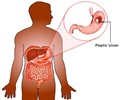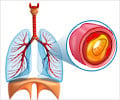- Definition and Facts about Peptic Ulcer (Stomach Ulcer) - (http://www.emedicinehealth.com/peptic_ulcers/article_em.htm)
- Peptic Ulcer Disease - (http://emedicine.medscape.com/article/181753-overview)
About
A break in the mucus membrane lining of the digestive tract results in ulcers.
The digestive tract is lined by mucus membrane. A break in the mucus membrane lining results in the formation of an ulcer.

Ulcers can affect the digestive tract right from the mouth to the anus. Symptoms depend on the location of the ulcers. Pain is a usual feature. In cases of deeper ulcers, bleeding may be present.
Ulcers could be due to various causes. These include infectious causes like Helicobacter pylori resulting in stomach ulcers, inflammatory causes like Crohn’s disease and ulcerative colitis, or spicy food, alcohol or medications. In some cases, ulcers may be due to a malignancy. Hence, it is important to identify the cause of the ulcers and treat accordingly.
Detection of ulcers in the mouth is usually straightforward, since it is the visible part of the digestive tract. Ulcer diagnosis in other parts of the digestive tract is not as simple due to the inaccessibility of these parts. However, newer procedures like endoscopy and colonoscopy have made diagnosis of inaccessible ulcers also possible.
Upper Digestive Tract Ulcers
Conditions that result in ulcers of the upper part of the digestive tract are listed below.
The causes of ulcers of the upper digestive tract are listed below:
Ulcers in the Oral Cavity: Ulcers in the oral cavity could be due to multiple causes. Some conditions that result in ulcers of the mouth are:
- Recurrent Aphthous Stomatitis: Recurrent aphthous stomatitis is a common condition that results in recurrent small painful ulcers in the mouth. The ulcers are shallow, round or ovoid and recur at intervals of a few days or up to 2 to 3 months.
- Trauma, Cancer, and Infections like Syphilis and Tuberculosis: These conditions result in a single mouth ulcer. If the ulcer does not heal in 10-14 days after the source of trauma is removed, it should be evaluated for cancer.
- Behçet’s disease: Behçet’s disease is an inflammatory condition in which the patient suffers from recurrent oral aphthous ulcers. In addition, the patient also suffers from genital ulcers, inflammation of the eye and skin lesions. In some cases, joints, nervous system, blood vessels and intestines may also be affected.
- Herpes: Viral infections like herpes can cause painful mouth ulcers. Herpes usually manifests as small boils or blisters. Lymph nodes in the neck may be swollen.
- Vitamin Deficiency: Vitamin deficiency, especially deficiency of vitamin B and C can result in mouth ulcers.
Ulcers of the Esophagus:
- Esophagitis: Esophagitis is a condition marked by inflammation of the esophagus or food pipe, sometimes accompanied by ulceration. It is often caused by reflux of acid from the stomach into the esophagus.
- Mallory-Weiss Tear: Mallory-Weiss tear is a condition where the lining of the esophagus is torn due to prolonged vomiting or conditions where the abdominal pressure is increased like coughing, severe hiccupping or childbirth.
Stomach and Duodenal Ulcers: Stomach and duodenal ulcers cause pain in the upper part of the abdomen. The pain in stomach ulcers is usually increased just following a meal, whereas in duodenal ulcers, it occurs 2 to 3 hours after a meal. The pain in duodenal ulcers is usually relieved with food or antacids. It may wake up the patient at night. The pain of stomach or duodenal ulcer may be accompanied by dark stools and anemia (due to bleeding from the ulcer). Other symptoms like belching, bloating, and distention of the abdomen may also be present.
Causes of stomach and duodenal ulcers include:
- Helicobacter Pylori Infection: Infection with a bacterium called H. pylori results in stomach ulcers. Treatment with a specific course of antibiotics and acid suppressant is used to eradicate the bacteria.
- NSAIDs: Painkillers belonging to the NSAID group like indomethacin, naproxen and diclofenac, especially when used continuously for conditions like arthritis, can cause stomach ulcers. These drugs damage the stomach lining resulting in ulcers. The patient usually gives a history of using these drugs, sometimes maybe on an empty stomach. This helps to diagnose the condition.
- Alcohol and Caffeine: Alcohol and caffeine intake irritates the stomach lining and increases the chances of ulcers.
- Stress: Stressful conditions like trauma, burns, surgery and severe medical illness can result in stomach ulcers.
- Stomach Cancer: In rare cases, the stomach ulcer may be over a cancerous area. Patients have additional symptoms of unexplained weight loss, progressive difficulty in swallowing, and sometimes vomiting.
- Zollinger-Ellison Syndrome: Zollinger-Ellison syndrome results in multiple stomach and duodenal ulcers. The patient may also suffer from kidney stones, watery diarrhea, or malabsorption. The condition is diagnosed by measuring the levels of gastrin, a hormone that stimulates the secretion of gastric acid.
Lower Digestive Tract Ulcers
Conditions that result in ulcers of the lower part of the digestive tract are listed below.
Some of the conditions that result in ulcers of the lower digestive tract are:
Intestinal and Anal Ulcers:
- Ulcerative Colitis: Ulcerative colitis is an inflammatory disease where multiple ulcers are present in the large intestines. The patient may complain of blood in stools, frequent stools with mucus discharge, pain in abdomen and weight loss. The patient may also show the presence of inflammation at other sites like the eyes, outer covering of lungs, skin and joints.
- Infection: Infections like HIV, tuberculosis, cytomegalovirus and typhoid can result in bowel ulcers especially in complicated cases. Symptoms of the underlying infection are usually obvious in these cases.
- Cancer: Cancer can affect the bowels and result in ulceration. The patient may suffer from weight loss, blood in stools, abdominal pain and discomfort, changes in bowel habits and narrowing of stools. A biopsy through colonoscopy helps to diagnose the condition.
- Anal Fissure: A tear in the anal region can result in the formation of a fissure, which is very painful and can bleed. The pain is particularly more while passing stools.
- Drugs: Drugs like enteric coated potassium and NSAIDs can irritate the intestinal lining resulting in ulcers. A history of drug intake should be elicited in patients with intestinal ulcers.
- Reduced Blood Supply: Reduced blood supply to the colon can result in ulcerations. It could occur due to a number of reasons like following a cardiac problem, a clot in the blood vessels supplying to the intestines or inflammation of the blood vessels. The patient may show symptoms like abdominal pain, diarrhea, and bleeding.
- Radiation: Radiation damages the lining of the intestines resulting in ulcerations. The patient may show symptoms of abdominal cramps, bleeding and mucus discharge. A history of prior radiation can be elicited from these patients.
Ulcers at Multiple Sites in the Digestive Tract:
- Crohn’s Disease: Crohn’s disease is an autoimmune disease that can result in ulcers anywhere from the mouth to the large intestines, though it more commonly affects the intestines. Symptoms vary from mild to severe and may include abdominal pain, fatigue, loss of appetite, pain while passing stools, diarrhea, weight loss and bleeding. Other organs like the joints, eyes and skin may also be involved.
Frequently Asked Questions
1. Which doctor should I visit in case I suffer from digestive tract ulcers?
You should visit a gastroenterologist in case you suffer from digestive tract ulcers.
2. How are digestive tract ulcers diagnosed?
Ulcers in the upper digestive tract are diagnosed using a procedure called endoscopy. In this procedure, a thin tube with a camera at the end is introduced through the mouth and the inner lining is visualized. A biopsy is also taken in areas of abnormality. Similarly, lower digestive tract ulcers are diagnosed using a tube introduced through the anus. This procedure is called colonoscopy or sigmoidoscopy, depending on the extent the tube is introduced in the bowels.
3. How is the cause of the digestive tract ulcer diagnosed?
The cause of digestive tract ulcers is often diagnosed based on the history of the patient and associated symptoms. A biopsy obtained during endoscopy or colonoscopy also helps to diagnose the cause. Additional tests may be required in some cases, like arteriography in case of reduced blood supply to the bowel.









